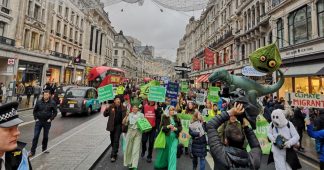by David Graeber
21 May 2019
A new movement is demanding solutions. They may just be in time to save the planet.
On April 15, thousands of activists from a movement called Extinction Rebellion started occupying several sites in central London, shutting down major roads and demanding the country’s politicians take immediate, drastic action in the face of climate change.
For more than a week, the streets were awash with an infectious sort of hope. Beyond the potent symbol of popular power represented by their presence in the heart of the city, activists and passers-by had the chance to experiment with collective politics. Yes, there were camera-worthy stunts and impossible-to-ignore disruptions of business as usual. But people also assembled, broke into discussion groups and returned with proposals. If the government wasn’t talking about the climate, Extinction Rebellion would lead by example.
The action was the crest of a wave that arguably began with the high school walkouts over the climate that had been sweeping Europe since late last year, and it was remarkable for including thousands of citizens — many from small towns with no experience of radical politics — who were willing, sometimes even eager, to risk arrest.
Their demands were, and are, simple. First, that the government declare a state of emergency and “tell the truth” about the global situation — that thousands of species are in danger of extinction, that there is a very real possibility that human life itself may eventually follow. Second, that Britain set a goal to eliminate all carbon emissions by 2025, and third, that the specifics of this emergency program be worked out not from above, but through the creation of citizens’ assemblies.
Amid simmering public anger over dissatisfaction with government inaction on the climate, the protests changed the public conversation so quickly and so widely that politicians have been forced to take notice and meet with activists they could once have safely ignored.
The apparent paralysis of the forces of order in the face of what looked a lot like a nonviolent uprising merely echoes the paralysis of the government itself. For months now, Parliament has largely abandoned the business of government entirely, unable to resolve the question of how and whether Britain will leave the European Union, yet at the same time seemingly unable to seriously discuss, let alone legislate, anything else. But the squabbling and endless recriminations in Westminster are just a particularly farcical version of a global phenomenon. The world’s political classes are, increasingly, rendering themselves almost completely irrelevant in the eyes of their constituents.
Nowhere is this more obvious than in the case of climate change. Scientists agree that humanity faces an existential threat. The global public overwhelmingly agrees with them. Young people even in rich countries like America and Britain, terrified of what the world will look like when they are in their 50s and the current governing elites are safely dead, are increasingly willing to embrace extraordinary measures. In both countries, more young people are questioning or rejecting capitalism itself.
To many of us, pretty much anything seems better than carrying on as usual, unto disaster. If ever a time called for grand visions, this is it. Yet politicians almost everywhere seem unable to think beyond the next election. The kind of vision in public works and collaboration that no more than a few generations ago created the United Nations, welfare states, space programs and the internet now seems inconceivable to the richest and most powerful governments on earth, even if the very fate of the planet depends on it.
How did this happen?
The last 30 years or so have seen a kind of war on the very idea of visionary politics. Where ’60s rebels called for “all power to the imagination,” the consensus of the opinion makers who took over as those social movements sputtered has been precisely the opposite: The very idea of unleashing the human imagination on political life, we are consistently told, can lead only to economic misery, if not the gulag.
And as left and right both look to the past — the one toward midcentury welfare states and the other, darkly, toward xenophobia and nationalism — the collapsing center warns us to fear political passion of any sort. It’s all so much irrational “populism” — a term now used to tar anyone who objects that all key decisions affecting their lives should be made by technocrats trained in neoclassical economic theory. Yet the technocrats have so far proved utterly incapable of addressing the climate crisis.
If real passion and vision are necessary, they will have to come from outside the system. The activists who assembled and debated in London recognized that the goal of zero emissions in six years would require huge social and economic dislocation. But the very daunting nature of the task seemed to call out creative solutions.
These took many forms, from new mass transport systems to four- or even three-day work weeks, green industrial revolutions, spiritual awakenings and the replacement of the discipline of economics and its exhortations toward endless growth with a new science based on principles that rise to the challenges of a changing climate. Many of these ideas might seem ridiculous. Some no doubt are. But with scientists warning us we may have precious little time before rates of planetary warming lead to irreversible consequences, the one thing that seems clear is that refusal to engage in this kind of imaginative exercise is the real danger.
Threatened with irrelevance, some politicians have started to respond. In Britain, the opposition Labour Party under Jeremy Corbyn has now proposed that the first of Extinction Rebellion’s demands, a national state of climate emergency, be put to a vote in Parliament as early as Wednesday. Whether the motion is successful or not, it represents a previously difficult-to-imagine acknowledgment of the crisis.
It’s just barely possible that Britain, the nation that ushered in the Industrial Revolution and its explosive carbon emissions, might also be the first to make a serious effort to undo the damage.
But if the government can’t bring itself to do so, the people will have to. With any luck, they’ll be just in time to save the planet.
Source: NYT
Published at http://www.cadtm.org/If-Politicians-Can-t-Face-Climate-Change-Extinction-Rebellion-Will










